大学英语教材西方文化读本翻译整理【最新】
- 格式:docx
- 大小:34.87 KB
- 文档页数:16
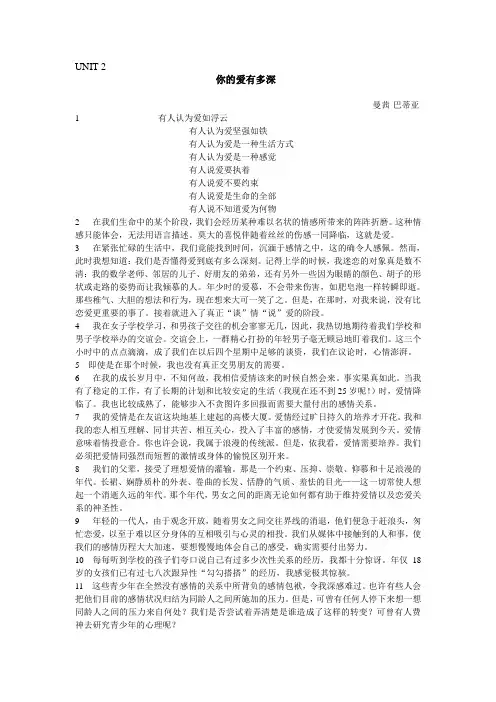
UNIT 2你的爱有多深曼茜·巴蒂亚1 有人认为爱如浮云有人认为爱坚强如铁有人认为爱是一种生活方式有人认为爱是一种感觉有人说爱要执着有人说爱不要约束有人说爱是生命的全部有人说不知道爱为何物2 在我们生命中的某个阶段,我们会经历某种难以名状的情感所带来的阵阵折磨。
这种情感只能体会,无法用语言描述。
莫大的喜悦伴随着丝丝的伤感一同降临,这就是爱。
3 在紧张忙碌的生活中,我们竟能找到时间,沉湎于感情之中,这的确令人感佩。
然而,此时我想知道:我们是否懂得爱到底有多么深刻。
记得上学的时候,我迷恋的对象真是数不清:我的数学老师、邻居的儿子、好朋友的弟弟,还有另外一些因为眼睛的颜色、胡子的形状或走路的姿势而让我倾慕的人。
年少时的爱慕,不会带来伤害,如肥皂泡一样转瞬即逝。
那些稚气、大胆的想法和行为,现在想来大可一笑了之。
但是,在那时,对我来说,没有比恋爱更重要的事了。
接着就进入了真正“谈”情“说”爱的阶段。
4 我在女子学校学习,和男孩子交往的机会寥寥无几,因此,我热切地期待着我们学校和男子学校举办的交谊会。
交谊会上,一群精心打扮的年轻男子毫无顾忌地盯着我们。
这三个小时中的点点滴滴,成了我们在以后四个星期中足够的谈资,我们在议论时,心情澎湃。
5 即使是在那个时候,我也没有真正交男朋友的需要。
6 在我的成长岁月中,不知何故,我相信爱情该来的时候自然会来。
事实果真如此。
当我有了稳定的工作,有了长期的计划和比较安定的生活(我现在还不到25岁呢!)时,爱情降临了。
我也比较成熟了,能够步入不贪图许多回报而需要大量付出的感情关系。
7 我的爱情是在友谊这块地基上建起的高楼大厦。
爱情经过旷日持久的培养才开花。
我和我的恋人相互理解、同甘共苦、相互关心,投入了丰富的感情,才使爱情发展到今天。
爱情意味着情投意合。
你也许会说,我属于浪漫的传统派。
但是,依我看,爱情需要培养。
我们必须把爱情同强烈而短暂的激情或身体的愉悦区别开来。
8 我们的父辈,接受了理想爱情的灌输。
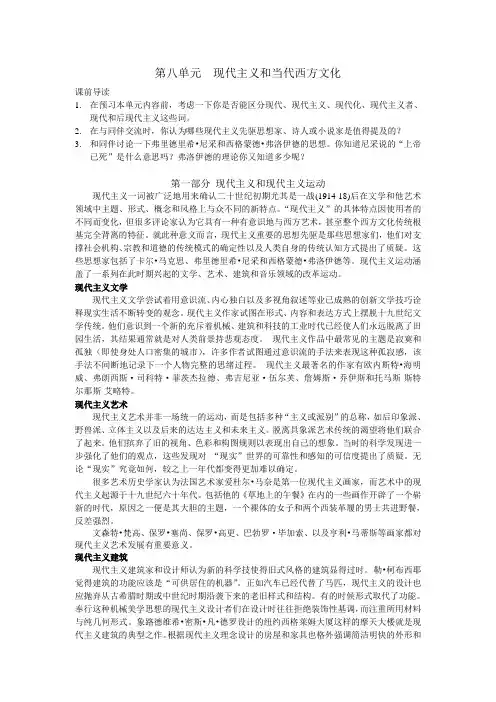
第八单元现代主义和当代西方文化课前导读1.在预习本单元内容前,考虑一下你是否能区分现代、现代主义、现代化、现代主义者、现代和后现代主义这些词。
2.在与同伴交流时,你认为哪些现代主义先驱思想家、诗人或小说家是值得提及的?3.和同伴讨论一下弗里德里希•尼采和西格蒙德•弗洛伊德的思想。
你知道尼采说的“上帝已死”是什么意思吗?弗洛伊德的理论你又知道多少呢?第一部分现代主义和现代主义运动现代主义一词被广泛地用来确认二十世纪初期尤其是一战(1914-18)后在文学和他艺术领域中主题、形式、概念和风格上与众不同的新特点。
“现代主义”的具体特点因使用者的不同而变化,但很多评论家认为它具有一种有意识地与西方艺术,甚至整个西方文化传统根基完全背离的特征。
就此种意义而言,现代主义重要的思想先驱是那些思想家们,他们对支撑社会机构、宗教和道德的传统模式的确定性以及人类自身的传统认知方式提出了质疑。
这些思想家包括了卡尔•马克思、弗里德里希•尼采和西格蒙德•弗洛伊德等。
现代主义运动涵盖了一系列在此时期兴起的文学、艺术、建筑和音乐领域的改革运动。
现代主义文学现代主义文学尝试着用意识流、内心独白以及多视角叙述等业已成熟的创新文学技巧诠释现实生活不断转变的观念。
现代主义作家试图在形式、内容和表达方式上摆脱十九世纪文学传统。
他们意识到一个新的充斥着机械、建筑和科技的工业时代已经使人们永远脱离了田园生活,其结果通常就是对人类前景持悲观态度。
现代主义作品中最常见的主题是寂寞和孤独(即使身处人口密集的城市),许多作者试图通过意识流的手法来表现这种孤寂感,该手法不间断地记录下一个人物完整的思绪过程。
现代主义最著名的作家有欧内斯特•海明威、弗朗西斯·司科特·菲茨杰拉德、弗吉尼亚·伍尔芙、詹姆斯·乔伊斯和托马斯·斯特尔那斯·艾略特。
现代主义艺术现代主义艺术并非一场统一的运动,而是包括多种“主义或派别”的总称,如后印象派、野兽派、立体主义以及后来的达达主义和未来主义。
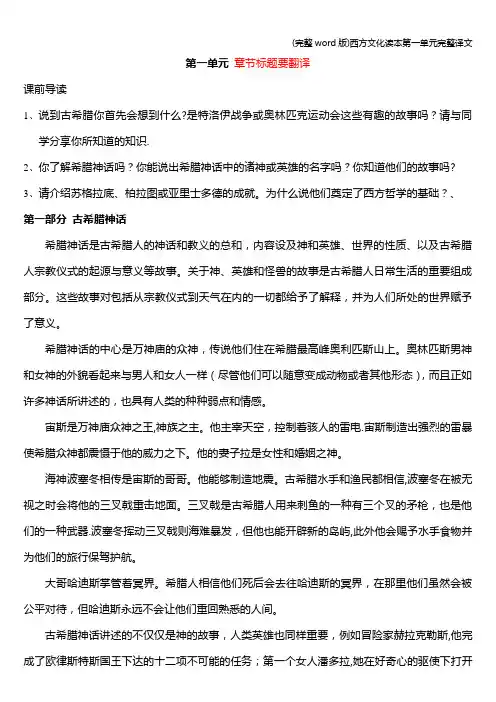
第一单元章节标题要翻译课前导读1、说到古希腊你首先会想到什么?是特洛伊战争或奥林匹克运动会这些有趣的故事吗?请与同学分享你所知道的知识.2、你了解希腊神话吗?你能说出希腊神话中的诸神或英雄的名字吗?你知道他们的故事吗?3、请介绍苏格拉底、柏拉图或亚里士多德的成就。
为什么说他们奠定了西方哲学的基础?、第一部分古希腊神话希腊神话是古希腊人的神话和教义的总和,内容设及神和英雄、世界的性质、以及古希腊人宗教仪式的起源与意义等故事。
关于神、英雄和怪兽的故事是古希腊人日常生活的重要组成部分。
这些故事对包括从宗教仪式到天气在内的一切都给予了解释,并为人们所处的世界赋予了意义。
希腊神话的中心是万神庙的众神,传说他们住在希腊最高峰奥利匹斯山上。
奥林匹斯男神和女神的外貌看起来与男人和女人一样(尽管他们可以随意变成动物或者其他形态),而且正如许多神话所讲述的,也具有人类的种种弱点和情感。
宙斯是万神庙众神之王,神族之主。
他主宰天空,控制着骇人的雷电.宙斯制造出强烈的雷暴使希腊众神都震慑于他的威力之下。
他的妻子拉是女性和婚姻之神。
海神波塞冬相传是宙斯的哥哥。
他能够制造地震。
古希腊水手和渔民都相信,波塞冬在被无视之时会将他的三叉戟重击地面。
三叉戟是古希腊人用来刺鱼的一种有三个叉的矛枪,也是他们的一种武器.波塞冬挥动三叉戟则海难暴发,但他也能开辟新的岛屿,此外他会赐予水手食物并为他们的旅行保驾护航。
大哥哈迪斯掌管着冥界。
希腊人相信他们死后会去往哈迪斯的冥界,在那里他们虽然会被公平对待,但哈迪斯永远不会让他们重回熟悉的人间。
古希腊神话讲述的不仅仅是神的故事,人类英雄也同样重要,例如冒险家赫拉克勒斯,他完成了欧律斯特斯国王下达的十二项不可能的任务;第一个女人潘多拉,她在好奇心的驱使下打开了潘多拉之盒将灾难带到人间;还有纳克索斯,他爱上自己倒影等等.此外,怪兽和半兽人也在这些神话中起重要作用,其中有双翼神马帕格索斯,人马兽肯陶洛斯,带鹰翼的狮身女怪斯芬克斯,鹰身女妖哈比等,他们中的许多和希腊神话中的众神和人类英雄一样广为人知。

大学英语课文翻译参考译文第一单元生活方式的改变课文A 在美国,不少人对乡村生活怀有浪漫的情感。
许多居住在城镇的人梦想着自己办个农场,梦想着靠土地为生。
很少有人真去把梦想变为现实。
或许这也没有什么不好,因为,正如吉姆多尔蒂当初开始其写作和农场经营双重生涯时所体验到的那样,农耕生活远非轻松自在。
但他写道,自己并不后悔,对自己做出的改变生活方式的决定仍热情不减。
多尔蒂先生创建自己的理想生活售姆多尔蒂有两件事是我一直想做的——写作与务农。
如今我同时做着这两件事。
作为作家,我和EB怀特不属同一等级,作为农场主,我和乡邻也不是同一类人,不过我应付得还行。
在城市以及郊区历经多年的怅惘失望之后,我和妻子桑迪终于在这里的乡村寻觅到心灵的满足。
这是一种自力更生的生活。
我们食用的果蔬几乎都是自己种的。
自家饲养的鸡提供鸡蛋,每星期还能剩余几十个出售。
自家养殖的蜜蜂提供蜂蜜,我们还自己动手砍柴,足可供过冬取暖之用。
这也是一种令人满足的生活。
夏日里我们在河上荡舟,在林子里野餐,骑着自行车长时间漫游。
冬日里我们滑雪溜冰。
我们为落日的余辉而激动。
我们爱闻大地回暖的气息,爱听牛群哞叫。
我们守着看鹰儿飞过上空,看玉米田间鹿群嬉跃。
但如此美妙的生活有时会变得相当艰苦。
就在三个月前,气温降到华氏零下30度,我们辛苦劳作了整整两天,用一个雪橇沿着河边拖运木柴。
再过三个月,气温会升到95度,我们就要给玉米松土,在草莓地除草,还要宰杀家禽。
前一阵子我和桑迪不得不翻修后屋顶。
过些时候,四个孩子中的两个小的,16岁的吉米和13岁的埃米莉,会帮着我一起把拖了很久没修的室外厕所修葺一下,那是专为室外干活修建的。
这个月晚些时候,我们要给果树喷洒药水,要油漆谷仓,要给菜园播种,要赶在新的小鸡运到之前清扫鸡舍。
在这些活计之间,我每周要抽空花五、六十个小时,不是打字撰文,就是为作为自由撰稿人投给报刊的文章进行采访。
桑迪则有她自己繁忙的工作日程。
除了日常的家务,她还照管菜园和蜂房,烘烤面包,将食品装罐、冷藏,开车送孩子学音乐,和他们一起练习,自己还要上风琴课,为我做些研究工作并打字,自己有时也写写文章,还要侍弄花圃、堆摞木柴、运送鸡蛋。
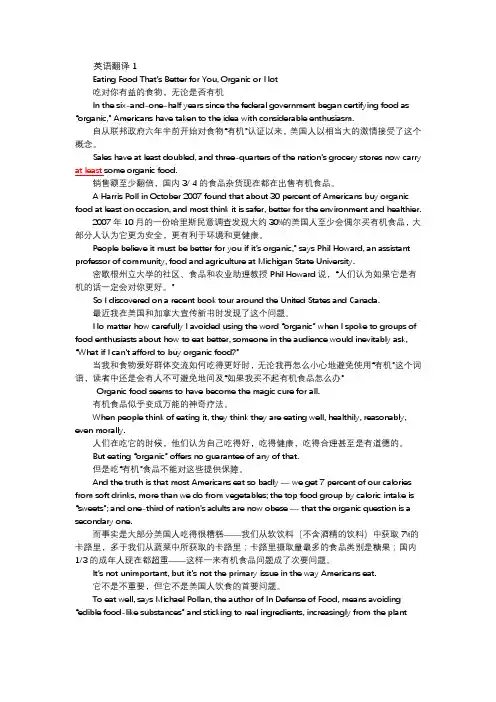
英语翻译1Eating Food That’s Better for You, Organic or Not吃对你有益的食物,无论是否有机In the six-and-one-half years since the federal government began certifying food as “organic,” Americans have taken to the idea with considerable enthusiasm.自从联邦政府六年半前开始对食物“有机”认证以来,美国人以相当大的激情接受了这个概念。
Sales have at least doubled, and three-quarters of the nation’s grocery stores now carry at least some organic food.销售额至少翻倍,国内3/ 4的食品杂货现在都在出售有机食品。
A Harris Poll in October 2007 found that about 30 percent of Americans buy organic food at least on occasion, and most think it is safer, better for the environment and healthier.2007年10月的一份哈里斯民意调查发现大约30%的美国人至少会偶尔买有机食品,大部分人认为它更为安全,更有利于环境和更健康。
People believe it must be better for you if it’s organic,” says Phil Howard, an assistant professor of community, food and agriculture at Michigan State University.密歇根州立大学的社区、食品和农业助理教授Phil Howard说,“人们认为如果它是有机的话一定会对你更好。
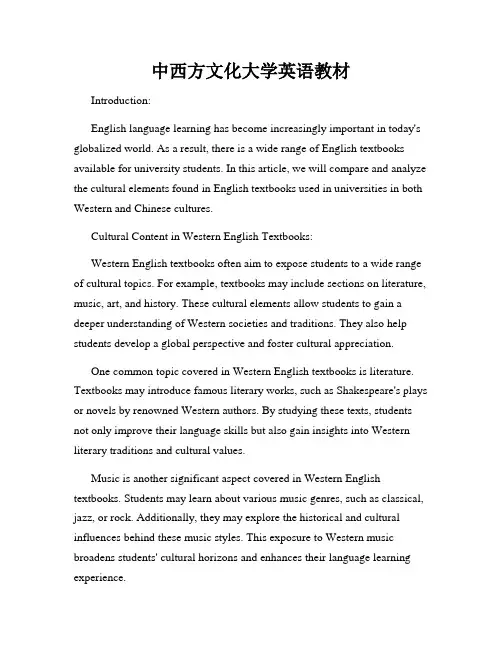
中西方文化大学英语教材Introduction:English language learning has become increasingly important in today's globalized world. As a result, there is a wide range of English textbooks available for university students. In this article, we will compare and analyze the cultural elements found in English textbooks used in universities in both Western and Chinese cultures.Cultural Content in Western English Textbooks:Western English textbooks often aim to expose students to a wide range of cultural topics. For example, textbooks may include sections on literature, music, art, and history. These cultural elements allow students to gain a deeper understanding of Western societies and traditions. They also help students develop a global perspective and foster cultural appreciation.One common topic covered in Western English textbooks is literature. Textbooks may introduce famous literary works, such as Shakespeare's plays or novels by renowned Western authors. By studying these texts, students not only improve their language skills but also gain insights into Western literary traditions and cultural values.Music is another significant aspect covered in Western English textbooks. Students may learn about various music genres, such as classical, jazz, or rock. Additionally, they may explore the historical and cultural influences behind these music styles. This exposure to Western music broadens students' cultural horizons and enhances their language learning experience.Cultural Content in Chinese English Textbooks:In comparison to Western English textbooks, Chinese English textbooks tend to focus more on language acquisition rather than cultural exploration. While there may be some cultural elements incorporated, they are often condensed and integrated into language learning exercises.Chinese English textbooks might introduce Chinese proverbs or idiomatic expressions that reflect specific cultural values. For example, students may learn the proverb "风水轮流转" (fēngshuǐ lúnliú zhuǎn), which means "fortune can change for better or worse." This provides students with a glimpse into Chinese cultural beliefs and mindset.Additionally, Chinese English textbooks may incorporate traditional Chinese festivals and customs. Students might learn about the significance of festivals like Spring Festival (Chinese New Year) or Mid-Autumn Festival, along with associated cultural practices. These topics allow students to understand aspects of Chinese culture while strengthening their language skills.Comparison and Analysis:While Western English textbooks place a heavier emphasis on cultural content, Chinese English textbooks prioritize language acquisition. Both approaches have their merits. Western textbooks expose students to a wide range of cultural topics, facilitating cross-cultural understanding. On the other hand, Chinese textbooks create a more language-focused learning environment.In terms of language fluency and cultural understanding, Western English textbooks may have an advantage. By studying literature and music, students are not only exposed to the language but also the social, historical, and artistic contexts in which it is used. This multi-dimensional approach enhances language fluency and cultural competency simultaneously.However, Chinese English textbooks also play a crucial role by providing students with a solid language foundation. By integrating cultural elements into language exercises, students are exposed to practical language usage while gaining insights into Chinese culture.Conclusion:English textbooks used in universities in both Western and Chinese cultures have unique approaches to incorporating cultural content. Western textbooks focus more on exposing students to various aspects of Western culture, while Chinese textbooks prioritize language acquisition with condensed cultural elements. Both methods contribute to language learning and cultural understanding in their respective contexts. By understanding these differences, educators can select appropriate textbooks to meet the diverse needs of students.。
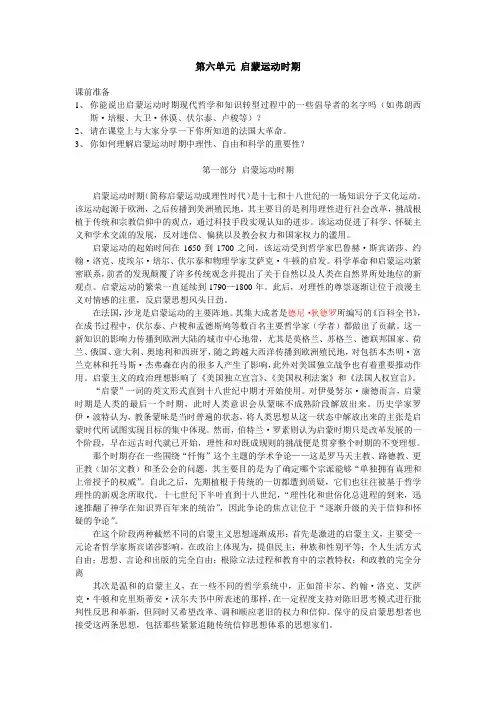
第六单元启蒙运动时期课前准备1、你能说出启蒙运动时期现代哲学和知识转型过程中的一些倡导者的名字吗(如弗朗西斯·培根、大卫·休谟、伏尔泰、卢梭等)?2、请在课堂上与大家分享一下你所知道的法国大革命。
3、你如何理解启蒙运动时期中理性、自由和科学的重要性?第一部分启蒙运动时期启蒙运动时期(简称启蒙运动或理性时代)是十七和十八世纪的一场知识分子文化运动。
该运动起源于欧洲,之后传播到美洲殖民地。
其主要目的是利用理性进行社会改革,挑战根植于传统和宗教信仰中的观点,通过科技手段实现认知的进步。
该运动促进了科学、怀疑主义和学术交流的发展,反对迷信、偏狭以及教会权力和国家权力的滥用。
启蒙运动的起始时间在1650到1700之间,该运动受到哲学家巴鲁赫·斯宾诺莎、约翰·洛克、皮埃尔·培尔、伏尔泰和物理学家艾萨克·牛顿的启发。
科学革命和启蒙运动紧密联系,前者的发现颠覆了许多传统观念并提出了关于自然以及人类在自然界所处地位的新观点。
启蒙运动的繁荣一直延续到1790—1800年。
此后,对理性的尊崇逐渐让位于浪漫主义对情感的注重,反启蒙思想风头日劲。
在法国,沙龙是启蒙运动的主要阵地。
其集大成者是德尼·狄德罗所编写的《百科全书》,在成书过程中,伏尔泰、卢梭和孟德斯鸠等数百名主要哲学家(学者)都做出了贡献。
这一新知识的影响力传播到欧洲大陆的城市中心地带,尤其是英格兰、苏格兰、德联邦国家、荷兰、俄国、意大利、奥地利和西班牙,随之跨越大西洋传播到欧洲殖民地,对包括本杰明·富兰克林和托马斯·杰弗森在内的很多人产生了影响,此外对美国独立战争也有着重要推动作用。
启蒙主义的政治理想影响了《美国独立宣言》、《美国权利法案》和《法国人权宣言》。
“启蒙”一词的英文形式直到十八世纪中期才开始使用。
对伊曼努尔·康德而言,启蒙时期是人类的最后一个时期,此时人类意识会从蒙昧不成熟阶段解放出来。
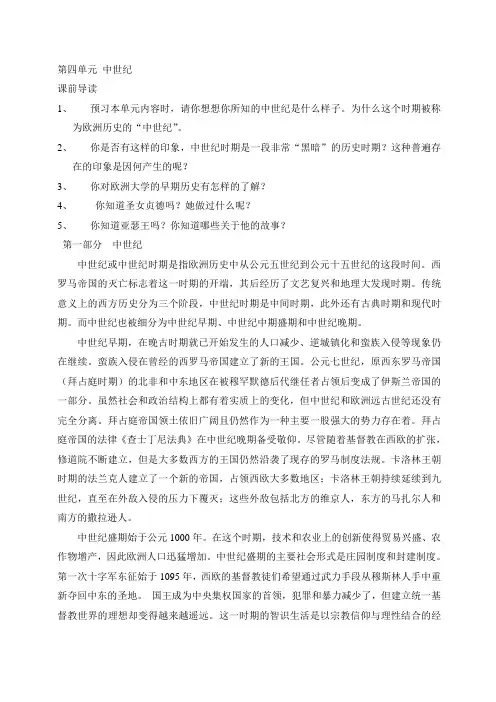
第四单元中世纪课前导读1、预习本单元内容时,请你想想你所知的中世纪是什么样子。
为什么这个时期被称为欧洲历史的“中世纪”。
2、你是否有这样的印象,中世纪时期是一段非常“黑暗”的历史时期?这种普遍存在的印象是因何产生的呢?3、你对欧洲大学的早期历史有怎样的了解?4、你知道圣女贞德吗?她做过什么呢?5、你知道亚瑟王吗?你知道哪些关于他的故事?第一部分中世纪中世纪或中世纪时期是指欧洲历史中从公元五世纪到公元十五世纪的这段时间。
西罗马帝国的灭亡标志着这一时期的开端,其后经历了文艺复兴和地理大发现时期。
传统意义上的西方历史分为三个阶段,中世纪时期是中间时期,此外还有古典时期和现代时期。
而中世纪也被细分为中世纪早期、中世纪中期盛期和中世纪晚期。
中世纪早期,在晚古时期就已开始发生的人口减少、逆城镇化和蛮族入侵等现象仍在继续。
蛮族入侵在曾经的西罗马帝国建立了新的王国。
公元七世纪,原西东罗马帝国(拜占庭时期)的北非和中东地区在被穆罕默德后代继任者占领后变成了伊斯兰帝国的一部分。
虽然社会和政治结构上都有着实质上的变化,但中世纪和欧洲远古世纪还没有完全分离。
拜占庭帝国领土依旧广阔且仍然作为一种主要一股强大的势力存在着。
拜占庭帝国的法律《查士丁尼法典》在中世纪晚期备受敬仰。
尽管随着基督教在西欧的扩张,修道院不断建立,但是大多数西方的王国仍然沿袭了现存的罗马制度法规。
卡洛林王朝时期的法兰克人建立了一个新的帝国,占领西欧大多数地区;卡洛林王朝持续延续到九世纪,直至在外敌入侵的压力下覆灭;这些外敌包括北方的维京人,东方的马扎尔人和南方的撒拉逊人。
中世纪盛期始于公元1000年。
在这个时期,技术和农业上的创新使得贸易兴盛、农作物增产,因此欧洲人口迅猛增加。
中世纪盛期的主要社会形式是庄园制度和封建制度。
第一次十字军东征始于1095年,西欧的基督教徒们希望通过武力手段从穆斯林人手中重新夺回中东的圣地。
国王成为中央集权国家的首领,犯罪和暴力减少了,但建立统一基督教世界的理想却变得越来越遥远。
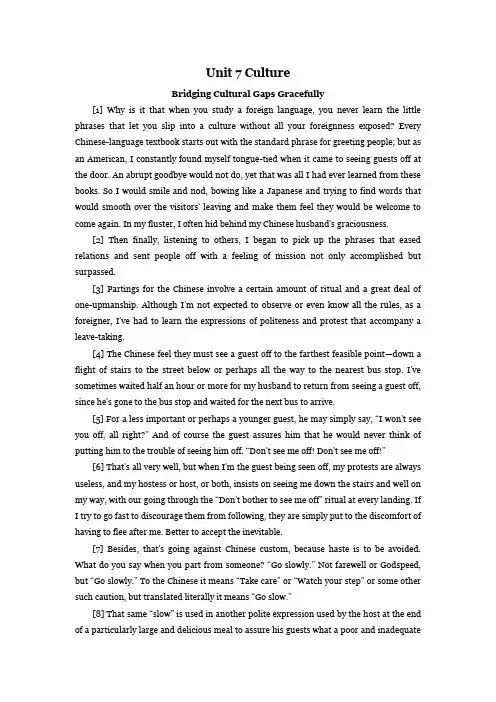
Unit 7 CultureBridging Cultural Gaps Gracefully[1] Why is it that when you study a foreign language, you never learn the little phrases that let you slip into a culture without all your foreignness exposed? Every Chinese-language textbook starts out with the standard phrase for greeting people; but as an American, I constantly found myself tongue-tied when it came to seeing guests off at the door. An abrupt goodbye would not do, yet that was all I had ever learned from these books. So I would smile and nod, bowing like a Japanese and trying to find words that would smooth over the visitors' leaving and make them feel they would be welcome to come again. In my fluster, I often hid behind my Chinese husband's graciousness.[2] Then finally, listening to others, I began to pick up the phrases that eased relations and sent people off with a feeling of mission not only accomplished but surpassed.[3] Partings for the Chinese involve a certain amount of ritual and a great deal of one-upmanship. Although I'm not expected to observe or even know all the rules, as a foreigner, I've had to learn the expressions of politeness and protest that accompany a leave-taking.[4] The Chinese feel they must see a guest off to the farthest feasible point—down a flight of stairs to the street below or perhaps all the way to the nearest bus stop. I've sometimes waited half an hour or more for my husband to return from seeing a guest off, since he's gone to the bus stop and waited for the next bus to arrive.[5] For a less import ant or perhaps a younger guest, he may simply say, “I won't see you off, all right?” And of course the guest assures him that he would never think of putting him to the trouble of seeing him off. “Don't see me off! Don't see me off!”[6] That's all very well, but when I'm the guest being seen off, my protests are always useless, and my hostess or host, or both, insists on seeing me down the stairs and well on my way, with our going through the “Don't bother to see me off” ritual at every landing. If I try to go fast to discourage them from following, they are simply put to the discomfort of having to flee after me. Better to accept the inevitable.[7] Besides, that's going against Chinese custom, because haste is to be avoided. What do you say when you part from someone? “Go slowly.” Not farewell or Godspeed, but “Go slowly.” To the Chinese it means “Take care” or “Watch your step” or some other such caution, but translated literally it means “Go slow.”[8] That same “slow” is used in another polite express ion used by the host at the end of a particularly large and delicious meal to assure his guests what a poor and inadequatehost he has been.[9] American and Chinese cultures are at polar opposites. An American hostess, complimented for her cooking skills, is likely to say, “Oh, I'm so glad that you liked it. I cooked it especially for you.” Not so a Chinese host or hostess (often the husband does the fancy cooking), who will instead apologize for giving you “nothing” even slightly edible and for not showing you enough honor by providing proper dishes.[10] The same rules hold true with regard to children. American parents speak proudly of their children's accomplishments, telling how Johnny made the school team or Jane made the honor roll. Not so Chinese parents, whose children, even if at the top of their class in school, are always so “naughty”, never studying, never listening to their elders, and so forth.[11] The Chinese take pride in “modesty”; the Americans in “straightforwardness”. That modesty has left many a Chinese hungry at an American table, for Chinese politeness calls for three refusals before one accepts an offer, and the American hosts takea “no” to mean “no”, whether it's the first, second, or third time.[12] Recently, a member of a delegation sent to China by a large American corporation complained to me about how the Chinese had asked them three times if they would be willing to modify some proposal, and each time the Americans had said “no” clearly and definitely. My friend was angry because the Chinese had not taken their word the first time. I recognized the problem immediately and wondered why the Americans had not studied up on cultural differences before coming to China. It would have saved them a lot of confusion and frustration in their negotiations.[13] Once you've learned the signals and how to respond, life becomes much easier. When guests come, I know I should immediately ask if they'd like a cup of tea. They will respond, “Please don't bother,” which is my signal to fetch tea.从容得体德跨越文化沟壑1 在外语学习中,学会一些简单的词组就能让你不知不觉地进入另一种文化,而丝毫不暴露你作为一个外国人的身份,但你为什么总是学不会呢?每本汉语课本都,一律从问候语开始的。
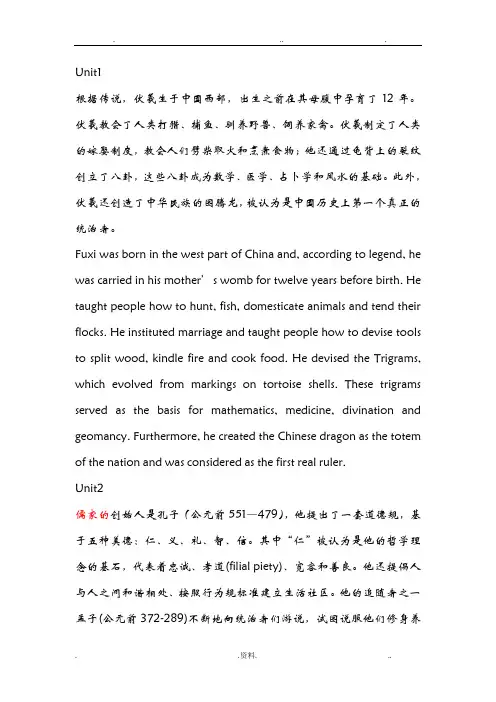
Unit1根据传说,伏羲生于中国西部,出生之前在其母腹中孕育了12年。
伏羲教会了人类打猎、捕鱼、驯养野兽、饲养家禽。
伏羲制定了人类的嫁娶制度,教会人们劈柴取火和烹煮食物;他还通过龟背上的裂纹创立了八卦,这些八卦成为数学、医学、占卜学和风水的基础。
此外,伏羲还创造了中华民族的图腾龙,被认为是中国历史上第一个真正的统治者。
Fuxi was born in the west part of China and, according to legend, he was carried in his mother’s womb for twelve years before birth. He taught people how to hunt, fish, domesticate animals and tend their flocks. He instituted marriage and taught people how to devise tools to split wood, kindle fire and cook food. He devised the Trigrams, which evolved from markings on tortoise shells. These trigrams served as the basis for mathematics, medicine, divination and geomancy. Furthermore, he created the Chinese dragon as the totem of the nation and was considered as the first real ruler.Unit2儒家的创始人是孔子(公元前551—479),他提出了一套道德规,基于五种美德:仁、义、礼、智、信。
其中“仁”被认为是他的哲学理念的基石,代表着忠诚、孝道(filial piety)、宽容和善良。
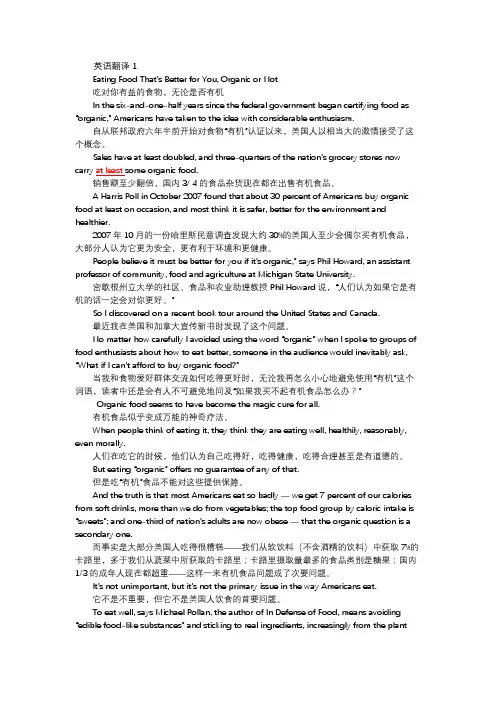
英语翻译1Eating Food That’s Better for You, Organic or Not吃对你有益的食物,无论是否有机In the six-and-one-half years since the federal government began certifying food as “organic,” Americans have taken to the idea with considerable enthusiasm.自从联邦政府六年半前开始对食物“有机”认证以来,美国人以相当大的激情接受了这个概念。
Sales have at least doubled, and three-quarters of the nation’s grocery stores now carry at least some organic food.销售额至少翻倍,国内3/ 4的食品杂货现在都在出售有机食品。
A Harris Poll in October 2007 found that about 30 percent of Americans buy organic food at least on occasion, and most think it is safer, better for the environment and healthier.2007年10月的一份哈里斯民意调查发现大约30%的美国人至少会偶尔买有机食品,大部分人认为它更为安全,更有利于环境和更健康。
People believe it must be better for you if it’s organic,” says Phil Howard, an assistant professor of community, food and agriculture at Michigan State University.密歇根州立大学的社区、食品和农业助理教授Phil Howard说,“人们认为如果它是有机的话一定会对你更好。
Unit1根据传说,伏羲生于中国西部,出生之前在其母腹中孕育了12年。
伏羲教会了人类打猎、捕鱼、驯养野兽、饲养家禽。
伏羲制定了人类的嫁娶制度,教会人们劈柴取火和烹煮食物;他还通过龟背上的裂纹创立了八卦,这些八卦成为数学、医学、占卜学和风水的基础。
此外,伏羲还创造了中华民族的图腾龙,被认为是中国历史上第一个真正的统治者。
Fuxi was born in the west part of China and, according to legend, he was carried in his mother’s womb for twelve years before birth. He taught people how to hunt, fish, domesticate animals and tend their flocks. He instituted marriage and taught people how to devise tools to split wood, kindle fire and cook food. He devised the Trigrams, which evolved from markings on tortoise shells. These trigrams served as the basis for mathematics, medicine, divination and geomancy. Furthermore, he created the Chinese dragon as the totem of the nation and was considered as the first real ruler.Unit2儒家的创始人是孔子(公元前551—479),他提出了一套道德规范,基于五种美德:仁、义、礼、智、信。
其中“仁”被认为是他的哲学理念的基石,代表着忠诚、孝道(filial piety)、宽容和善良。
Unit 10 Satire in LiteratureThe Immortal BardIsaac Asimov“Oh, yes,” said Dr. Phineas Welch, “I can bring back the spirits of the illustrious dead.”He was a little drunk, or maybe he wouldn‟t have said it. Of course, it was perfectly all right to get a little drunk at the annual Christmas party.Scott Robertson, the school‟s young English instructor, adjusted his glasses and looked to right and left to see if they were overheard.“Really, Dr. Welch.”“I mean it. And not just the spirits. I bring back the bodies, too.”“I wouldn‟t have said it were possible,” said Robertson primly.“Why not? A simple matter of temporal transference.”“You mean time travel? But that‟s quite—uh—unusual.”“Not if you know how.”“Well, how, Dr. Welch?”“Think I‟m going to tell you?” asked the physicist gravely. He looked vaguely about for another drink and didn‟t find any. He said, “I brought quite a few back. Archimedes, Newton, Galileo. Poor fellows.”“Didn‟t they like it here? I should think they‟d have been fascinated by our modern science,” said Robertson. He was beginning to enjoy the conversation.“Oh, they were. They were. Especially Archimedes. I thought he‟d go mad with joy at first after I explained a little of it in some Greek I‟d boned up on, but no—no—”“What was wrong?”“Just a different culture. They couldn‟t get used to our way of life. They got terribly lonely and frightened. I had to send them back.”“That‟s too bad.”“Yes. Great minds, but not flexible minds. Not universal. So I tried Shakespeare.”“What?” yelled Robertson. This was getting closer to home.“Don‟t yell, my boy,” said Welch. “It‟s bad manners.”“Did you say you brought back Shakespeare?”“I did. I needed someone with a universal mind; someone who knew people well enough to be able to live with them centuries away from his own time. Shakespeare was the man. I‟ve got his signature. As a memento, you know.”“On you?” asked Robertson, eyes bugging.“Right here.” Welch fumbled in one vest pocket after another. “Ah, here it is.”A little piece of pasteboard was passed to the instructor. On one side it said: “L. Klein & Sons, Wholesale Hardware.” On t he other side, in straggly script, was written, “Willm Shakesper.”A wild surmise filled Robertson. “What did he look like?”“Not like his pictures. Bald and an ugly mustache. He spoke in a thick brogue. Of course, I did my best to please him with our times. I told him we thought highly of his plays and still put them on the boards. In fact, I said we thought they were the greatest pieces of literature in the English language, maybe in any language.”“Good. Good,” said Robertson breat hlessly.“I said people had written volumes of commentaries on his plays. Naturally he wanted to see one and I got one for him from the library.”“And?”“Oh, he was fascinated. Of course, he had trouble with the current idioms and references to events since 1600, but I helped out. Poor fellow. I don‟t think he ever expected such treatment. He kept saying, …God ha‟ mercy!What cannot be racked from words in five centuries?One could wring, methinks, a flood from a damp clout!”“He wouldn‟t say that.”“Why not? He wrote his plays as quickly as he could. He said he had to on account of the deadlines. He wrote Hamlet in less than six months. The plot was an old one. He just polished it up.”“That‟s all they do to a telescope mirror. Just polish it up,” said the English instructor indignantly.The physicist disregarded him. He made out an untouched cocktail on the bar some feet away and sidled toward it. “I told the immortal bard that we even gave college courses in Shakespeare.”“I give one.”“I know. I enrolled him in your evening extension course. I never saw a man so eager to find out what posterity thought of him as poor Bill was. He worked hard at it.”“You enrolled William Shakespeare in my course?” mumbled Robertson. Even as an alcoholic fantasy, the thought staggered him. And was it an alcoholic fantasy? He was beginning to recall a bald man with a queer way of talking...“Not under his real name, of course,” said Dr. Welch. “Never mind what he went under. It was a mistake, t hat‟s all. A big mistake. Poor fellow.” He had the cocktail nowand shook his head at it.“Why was it a mistake? What happened?”“I had to send him back to 1600,” roared Welch indignantly. “How much humiliation do you think a man can stand?”“What humiliation are you talking about?”Dr. Welch tossed off the cocktail. “Why, you poor simpleton, you flunked him.”不朽的诗人1 “哦,对了,”菲尼亚斯韦尔奇博士说,“我可以使那些故去的名人还魂。
第一单元英翻中Socrates was a classical Greek philosopher who is credited with laying the fundamentals of modern Western philosophy. He is a mysterious figure known chiefly through the accounts of later classical writers, especially the writings of his most famous student Plato. Socrates has become well known for his contribution to the field of ethics . His method of teaching, known as the Socrates Method, by asking and answering questions to stimulate critical thinking and to explain ideas remains a discussions . He also made important and lasting contributions to the field of epistemology and logic, and the influence of his ideas and approach remains a strong foundation for Western philosophy that followed. Socrates was the most colorful figure in the history of ancient philosophy. His fame was widespread in his own time, and his name soon become a household word although he constructed no philosophical system, established no school, and founded no sect.苏格拉底是一位古典希腊哲学家,他奠定了现代西方哲学的基础。
大学跨文化英语综合教程IUnit8ATasteofCulturalDifferences课文翻译A Taste of Cultural DifferencesHarry Triandis1 Many individuals are likely to have been exposed to only one culture. Even after exposure to many cultures, we are most likely to use the framework of our own culture (for example, the West or the East)to interpret events. To broaden one’s perspective, let me describe some surprising cultural differences.2 If you read stories about Asian and African cultures, you will get an idea of life that is very different from the one you get from thinking about Europeans or North Americans. For example, in a village in Thailand,friendliness, gentleness, and good humor are typical attributes of the people in the village. Face-to-face con?ict is usually avoided by not saying something unpleasant. For example, you would not say: “Your house is burning.” Instead you would say: “Why don’t you go and see your house?”In the village, women whose husbands had taken additional wives,although they were greatly disturbed, said nothing to their husbands. They did not want to put anyone on the spot!3 In this culture, conflict is usually followed by one of the people leaving the scene without explanation, confrontation, or argument. As a result, many families dissolved with little ceremony. Te polite way to say“no” to a requ est is to giggle; that communicates the person’s intentions perfectly.4 Throughout the world, religion governs the lives of many people.However, the extent to which this is true varies enormously from culture to culture. In Japan, for instance, onlyabout a fifth of the population takes religion seriously. In fact, some raise their children the Shinto way(according to traditional Japanese religion), marry the Christian way,and have Buddhist funerals. Religion is a matter of taste, similar to eating Chinese food or pizza. By contrast, in America and India, the majority of people take religion very seriously.5 Beliefs in main religions are often mixed with traditional beliefs,and frequently scientific beliefs are mixed in as well. For example, people will recognize that lightning is caused by electricity but will explain that phenomenon by saying that god has discharged it. Common traditional beliefs are sometimes spiritual: Te event is explained by a spirit that was mad, happy, angry, disturbed, or satisfied. Illness is not considered a major problem; instead it is viewed as a spiritual event. For example, enemies have put a spell on the sick person.6 Traditional healing is widely used in Africa than is modern medicine and the o bvious question is “why?”. While there are only about 100psychiatrists for 342 million people in Africa, there is little Western medicine (75 percent of the population do not know how to read or write)so it is not surprising that the vast majority of the population depends on traditional healing methods.7 These methods are derived from spiritual beliefs that all things have a soul in them. Stones, leaves, trees, rivers and even the earth itself are thought to be inhabited by spirits. People believe that illness occurs when a spirit is upset or when some of the natural relationships among the spirits have been disturbed. It thus is up to a traditional healer, who has the a bility to “control” the spirits.8 Do not look down on these healers; they are by no meansineffective.They havestudied their powers for as long as nine years. In some cases they have their own “association” that awards certif icates and makes them promise that they will not harm their future patients. During their studies,traditional healers generally learn to be good observers and to become familiar with the benefits of using plants for health purposes. They learn how to see what is wrong with their patients, and they take extensive medical history courses. They also know how to identify and use plant substances. These scientists have classified about 350,000 known plants,but the systematic study of the effects of such plants has only just begun.9 African healers learn about plant attributes and uses from their teachers, who in turn learned from traditions developed over 1,000 years of trial and error. They are quite skilled in their use of plants for healing,though they do make occasional mistakes with dosage.10 In observing other cultures, it is useful to keep in mind that we see the world less “as it is” and more “as we are.” Depending on the experiences we have had and the habits that we have acquired, we see events quite differently.参考译文感受文化差异哈里·特里安迪斯许多人可能只接触过一种文化,即使接触了许多不同的文化,我们大多还是会用自己的文化框架(例如西方文化或东方文化)去解释事情。
L1 The American Scots-Irish航行在五月花号上来自苏格兰和爱尔兰的移民们,他们是这块未被开垦土地的开拓者。
他们凭借着努力的工作和怀着自由强烈的信心对美国社会做出了伟大的贡献。
他们的贡献在于对财富的积累,同时也对美国文化特征的积累。
但不幸的是,他们的贡献并没有完全地被认可。
在下文中,你将会了解到这些移民者一些卓越的特征,并且你也将会重新发现他们对美国文化的重要性。
向南走在81号洲际公路上,两侧群山的如此的美丽,阳光投射过弥漫的烟雾洒在松树上。
你可以看到公路上的来来往往车流和汉堡王快餐店。
但我此刻却在注视着自己的影像:坐在四轮货运马车上坚强、乐观的女人,背着步枪走在一旁的硬汉,和放牛的孩子,他们一同在泥泞的被称作为荒漠之路的路上留下了足迹。
在阿巴拉契亚山脉的爱尔兰,我们的同胞,那些苏格兰爱尔兰人(下文称SI)在18世纪离开爱尔兰和英国北部在这里定居下来,他们驯服了荒漠。
建起了简单的小木屋,在贫瘠的土地上丢进玉米种子,他们继续奋斗,创立了自己的生活方式,很多人说,如果他们的生活方式还不算美国方式的话,那么肯定也构成了南部和中西部的基本生活方式。
以及整个美国劳动阶级的核心特点。
我下定决心要重新收回他们这些人的尊严——为他们自己也为了美国,这是亏欠已久的。
在维吉尼亚的公路尽头,我踏着狭窄曲折的小路,经过了间间小木屋,最终在阿利霍洛谷的入口停了下来。
我的曾曾祖父母都在这里掩埋,在附近山顶上的一片野森林里。
像其他人的祖先一样,他们的祖先们的墓碑只有石头。
我担心,当我们这一代死去的时候,他们的遗产会全部遗失——掩埋在雪崩似的间或用来嘲笑我的同胞、平凡化他们旅途的故事里。
他们来的时候两手空空,而且,因为一系列复杂的原因,他们中的许多人仍然两手空空。
站在这些坟墓上,我哽咽了。
讲述美国历史的时候,这些人被误解的太多,也被忽视的太多了。
他们做了伟大的贡献。
并且,他们,SI(有时候也称为Scotch-Irish)确是形成我们文化的一股力量。
T e x t B o o k 4Unit 1TextTwo college-age boys, unaware that making money usually involves hard work, are tempted by an advertisement that promises them an easy way to earn a lot of money. The boys soon learn that if something seems too good to be true, it probably is. 一个大学男孩,不清楚赚钱需要付出艰苦的劳动,被一份许诺轻松赚大钱的广告吸引了。
男孩们很快就明白,如果事情看起来好得不像真的,那多半确实不是真的。
BIG BUCKS THE EASY WAY轻轻松松赚大钱John G. Hubbell"You ought to look into this," I suggested to our two college-age sons. "It might be a way to avoid the indignity of having to ask for money all the time." I handed them some magazines in a plastic bag someone had hung on our doorknob.“你们该看看这个,”我向我们的两个读大学的儿子建议道。
“你们若想避免因为老是向人讨钱而有失尊严的话,这兴许是一种办法。
”我将挂在我们门把手上的、装在一个塑料袋里的几本杂志拿给他们。
A message printed on the bag offered leisurely, lucrative work ("Big Bucks the Easy Way!") of delivering more such bags.塑料袋上印着一条信息说,需要招聘人投递这样的袋子,这活儿既轻松又赚钱。